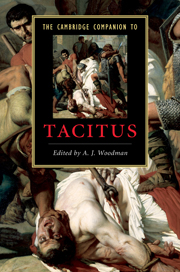Book contents
- Frontmatter
- Introduction
- Part I Contexts
- Part II Texts
- 3 The Agricola
- 4 The Germania as literary text
- 5 The faces of eloquence: the Dialogus de oratoribus
- 6 Fission and fusion: shifting Roman identities in the Histories
- 7 The Tiberian hexad
- 8 Hamlet without the prince? The Claudian Annals
- 9 ‘Is dying so very terrible?’ The Neronian Annals
- Part III Topics
- Part IV Transmission
- Chronological table
- Abbreviations and bibliography
- Index
4 - The Germania as literary text
from Part II - Texts
Published online by Cambridge University Press: 28 March 2010
- Frontmatter
- Introduction
- Part I Contexts
- Part II Texts
- 3 The Agricola
- 4 The Germania as literary text
- 5 The faces of eloquence: the Dialogus de oratoribus
- 6 Fission and fusion: shifting Roman identities in the Histories
- 7 The Tiberian hexad
- 8 Hamlet without the prince? The Claudian Annals
- 9 ‘Is dying so very terrible?’ The Neronian Annals
- Part III Topics
- Part IV Transmission
- Chronological table
- Abbreviations and bibliography
- Index
Summary
Scholars in the early decades of the twentieth century were responsible for ethnographically oriented studies that invalidated much of the preceding, mostly nineteenth-century, scholarship. Tacitus, particularly in the first half of the Germania, is guided as much by ethnographical commonplaces and generalisations as by any individual or empirically derived autopsy. As Syme succinctly put it, 'If Cornelius Tacitus was ever on the Rhine, he discloses no sign of it in the Germania'. Sources were available, from Posidonius to Caesar, to Pliny's Bella Germaniae (and the Naturalis Historia as well), to Aufidius Bassus' Bellum Germanicum. Information could have been had from returning merchants and soldiers, as was the case with Pliny. But Tacitus does not tell us much on any of this. Rives, following Lund, is surely right: 'although the work does contain a few verifiable observations, it is so shaped by ethnographic preconceptions as to be virtually unusable as a historical source'. Hence the somewhat hostile reaction of Syme. Rives himself mitigates Lund's historiographically bleak assessment, looking in particular to archaeological and other records, and suggesting that use of Tacitus involves 'careful evaluation and a willingness to acknowledge uncertainty'. But the fact remains that the Germania is far from reliable as a historical, anthropological or sociological work, however important it has been in the realm of reception. So the question remains as to what precisely the Germania is trying to be or do. There is also the question of how we are to read it.
- Type
- Chapter
- Information
- The Cambridge Companion to Tacitus , pp. 59 - 72Publisher: Cambridge University PressPrint publication year: 2010
- 3
- Cited by

